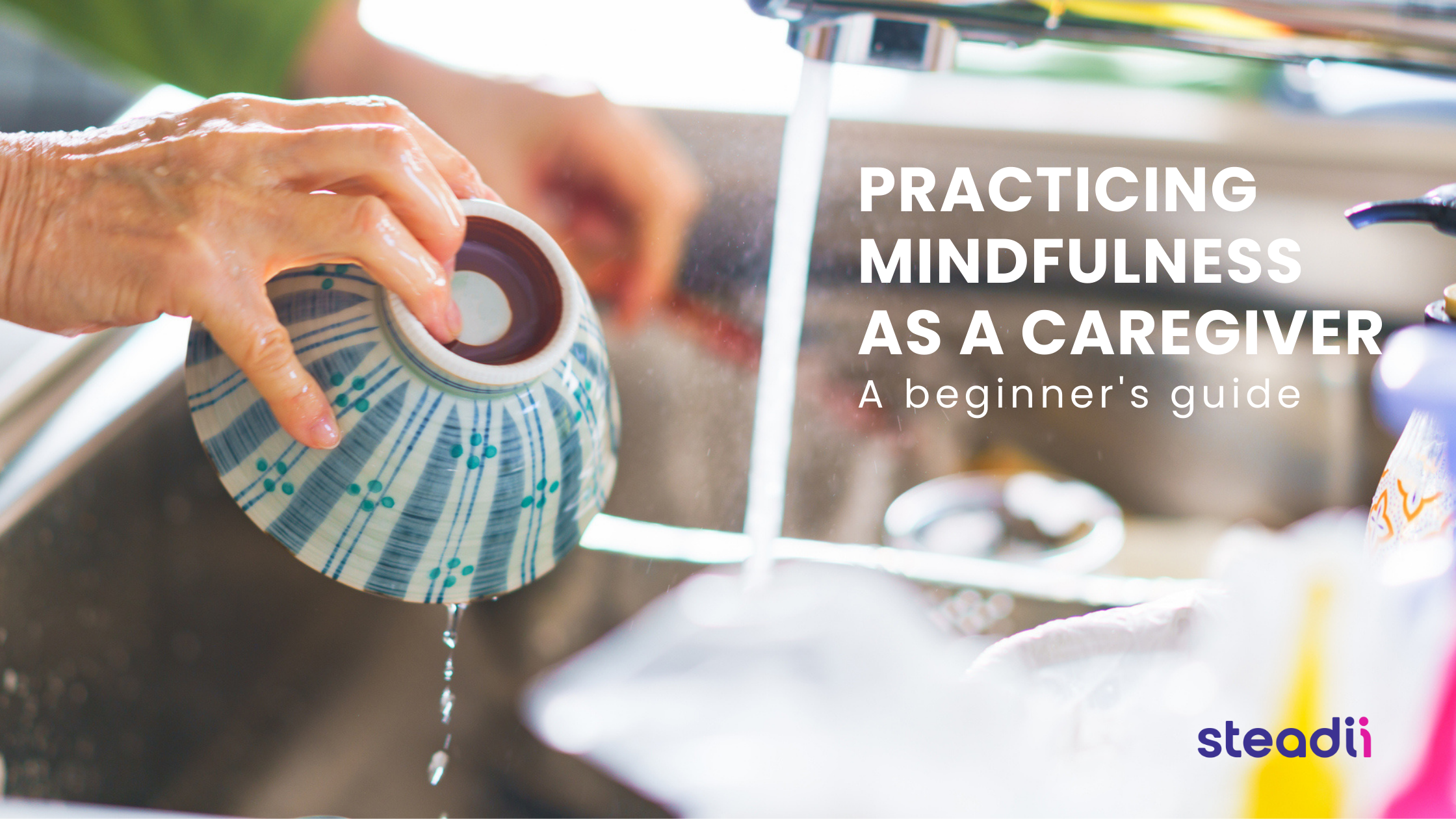Practicing mindfulness as a caregiver: a beginner’s guide
Reclaim your sense of peace and power by practicing mindfulness with three beginner-friendly practices curated specifically for caregivers.
“Most family caregivers don’t step into caregiving, we fall into it.”
Even the strongest, most big-hearted caregivers can quickly start to feel less like the hero they wish they could be for their loved one and more like a victim of life circumstances, continually hounded by a list of tasks that seems to multiply by the hour.
Let’s face it. Caregiving is a complex and challenging journey.
There can be a host of mixed emotions, confusing information, and endlessly changing circumstances — all of which can significantly tax your system. It can be easy to feel overstressed and overwhelmed.
In The Caregiver’s Compass: How to Navigate with Balance & Effectiveness Using Mindful Caregiving, Holly Whiteside writes, “Caregiving brings many mindless moments of reacting to circumstances. It can feel like concentrated living partly because the risks are more vital than in everyday life. They carry greater urgency, as you protect the life you have while trying to prolong the life of your loved one.”
As the demands on your time and energy snowball, you know in your heart that you need space and rest — that you need to reorient and ground yourself to regain control. You’ve heard that mindfulness practice is all the rage now and that, more than a fad, it does work! But, if you’re new to practicing mindfulness, you might wonder how and where to begin.
The good news is that mindfulness is simple and easy to practice pretty much anywhere. You don’t need to step away from your life physically. Mindfulness helps you engage with your life from a more peaceful and grounded state. With mindfulness, you truly can begin here and now. Let’s talk about how.
What is mindfulness?
First, let’s get clear on what mindfulness even is. At most basic, mindfulness is the practice of cultivating present-moment awareness of one’s thoughts, feelings, or sensations–ideally with a compassionate, non-judgmental lens. Common mindfulness techniques include meditation, bringing attention to your breath, and other intentional habits that help foster non-judgment and conscious observation of your thoughts and feelings.
What are the benefits of mindfulness?
Though mindfulness was brought to the Western world through Eastern spirituality, a secular practice of mindfulness has proliferated in the United States in recent decades. Jon Kabat-Zinn pioneered work in this space and launched the Mindfulness-Based Stress Reduction (MBSR) program at the University of Massachusetts Medical School in 1979. Kabat-Zinn’s goal was to use mindfulness practices to facilitate healing and improve the quality of life for individuals suffering from chronic pain and/or stress-related disorders.
Since that time, thousands of studies have documented the substantial mental and physical health benefits of mindfulness. This research inspired countless programs to incorporate mindfulness programs in hospitals, prisons, schools, veterans centers, and beyond.
As outlined by RADIAS Health, the considerable benefits of mindfulness include the following:
reduced stress
better focus and attention
decreased emotional reactivity
improved memory capacity
higher relationship satisfaction
better immune function
overall improved well-being
higher creativity
Given these benefits, it makes sense why mindfulness has become an increasingly popular technique to help individuals cope with stress, overwhelm, and difficult emotions.
With numerous options and advice related to mindfulness, getting started might feel overwhelming.
Here are three beginner-friendly mindfulness practices curated specifically for caregivers.
1. Step mindfully into caregiving
When you feel like you have fallen into caregiving by default, you might experience a tide of disorienting events and emotions. As a result, you may find yourself operating with greater defensiveness and reactivity.
Your alternative to getting swept up in the tide of events and emotions of caregiving is to step mindfully into meeting each moment with presence and self-awareness. In this case, take this advice literally.
To get started, take a five to 10-minute mindful walk around the block. If getting outside is not an option, slowly and mindfully make your way down a hallway.
Whatever you do, don’t rush. Move slowly and intentionally, and focus on your physical sensations as you walk. Notice the flex of your foot as it interacts with the ground. Sense the texture of your sock or shoe (or the floor, if you’re barefoot) against your skin. Feel the way your body moves not just horizontally but also vertically as your head bobs. Feel the temperature of the air against your skin. Don’t analyze or judge what is happening. For these five to ten minutes, practice focusing on the sensations.
At the end, check in with yourself and thank yourself for this gift of grounding presence.
2. Mindful listening (or watching)
For this practice, choose a piece of music — it can be a song you already love or one you’ve never heard before. If you choose one you already know and love, approach it like you are hearing it for the very first time. If you’re unsure what to choose, try one of the ideas in this calming playlist article.
Next, put on headphones and close your eyes. Bring a spirit of curiosity. Simply listen to the music rather than critique it. Challenge yourself to notice the subtle parts of the music. You are listening to experience all of the nuances. If your mind wanders, gently bring it back to the music.
Note that if you don’t have a song available, you can listen to the birds. As you become more practiced, you can even do this with sounds that you previously found stressful or annoying. Imagine the bothersome lawn mower becoming a pathway to inner peace!
3. Observe yourself like a character in a movie
Mindfulness researcher Dr. Kristin Neff offers an excellent visual for practicing mindfulness. Picture yourself in a movie theater, she says. A movie is playing on the screen, and you’re wrapped up in the story. You jump when the villain appears, bite your nails as the forces battle, gasp as plot twists are revealed. But then, in an instant, the person next to you sneezes. The reverie is broken. Suddenly, you are back in your seat with your popcorn and remember, “Oh, I’m watching a movie.” This awareness is mindfulness.
While engaged in a chore or task, such as washing dishes, try observing yourself like you are the character on the screen. Best you can without judging yourself, take note of your facial expressions and feelings. Feel the water against your hands. The more often you practice this, the more likely you are to get caught up in the story in your head. You become a peaceful observer of your life drama.
In summary, mindfulness is surprisingly simple and the benefits are often relatively quick. Don’t make these practices yet another thing to beat yourself up about. Focus more on doing them versus trying to do them well or right. Try one of the three practices for a couple of weeks before you give up. Switch them up if you want some variety but don’t give up. It’s up to you! The benefits will last well beyond your caregiving days. Mindfulness benefits you for your entire lifetime.
If you enjoy resources like this, would like to connect with other caregivers, or would like one-on-one support from a dedicated advocate, try Steadii.
Nhien Vuong, J.D., M. Div. is an international Enneagram presenter and the founder of Evolving Enneagram, a community-centered organization whose mission is to transform human ecosystems around the globe using a contemplative approach to the Enneagram. A former Stanford-trained attorney and ordained interspiritual Unity minister, Nhien marries a wealth of insight with deep compassion to support our conscious evolution.


